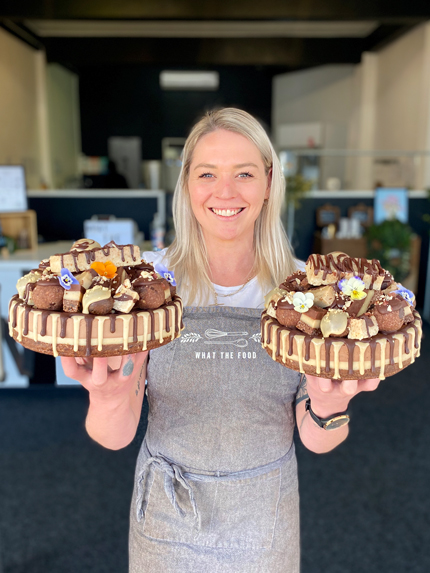Changing a life

Three years ago, What The Food founder Jorja Tarrant was battling anxiety, depression and an anorexia eating disorder.
Now she is beaming; singing the praises of small town living, company ownership and the therapeutic benefits of concocting sweet treats for health-conscious people or those with particular dietary needs.
The 27-year-old’s handmade slices, tarts and cakes are safe for coeliacs or those allergic to dairy products, and suitable for vegans or anyone aiming to avoid refined sugar and artificial food additives.
Her busy retail outlet on Te Awamutu’s main street is open three days a week. She has employed another baker to help meet demand from online orders and a growing list of cafés and restaurants throughout the Waikato.
The work motivates her to eat properly and look after herself.
“I need to be well to continue to do this because I’m having a really good time. Being able to do something I love is the most helpful thing in the world. Before, I was feeling so lost. Now, I actually have something to hold on to and I don’t want to lose it, I’ve worked too hard.”
The high achieving young sportswoman played competitive squash while ticking off a conjoint Waikato University degree in sport and leisure as well as screen and media.
At the end of her degree, completed under the prestigious Sir Edmond Hillary scholarship programme, she realised none of her specialty subjects interested her. Seeking direction, she undertook more study and became an increasingly unhappy secondary school teacher.
“My mental health was deteriorating, I was trying to gain control of my life. I started over-exercising, undereating; excluding myself from friends.”
A friend intervened to ensure she received specialist treatment and, as her recovery began, a relative encouraged her to venture into the kitchen.
She started making sweets for her cousin’s appreciative husband, a health-conscious athlete who insisted she try selling her edible wares.
The first market stall was a hit so she conjured a company name and began selling online, developing recipes and assembling dishes while listening to eating disorder recovery podcasts and experimenting with chocolate and coconut.
“That was my therapy, my little happy place. I like being really hands-on. I’d always put myself into the sporty bracket, but I’ve realised I’m creative.”
She also came to appreciate that food could be fun and that healthy eating should never be about deprivation.
“I’ve never been one to talk about my feelings much; I’m always just ‘good.’ But I also started sharing what I was going through, which really opened up a sense of community and conversations I hadn’t had before. It helped a hell of a lot.”
Residents from her home town have metaphorically and sometimes literally wrapped their arms around her, providing friendship, enthusiastic custom and support as she dealt with the ups and downs of entrepreneurship.
These people have, she says, helped her realise she deserves to occupy space in a world where once: “I was certain I had to shrink, I did not think I deserved to be there. It’s still weird to think about it; I feel sorry for that version of myself.”
Jorja has started offering cooking classes to children and hopes to expand her repertoire for adults, while continuing to extend the wholesale arm of her business.
She gets a particular kick out of introducing men – they tend to be the most dubious – to the pleasures of healthier sweets.
“It’s about having fun with food and giving yourself permission to enjoy it,” she says.
For Jorja, that also means always reminding herself the world will not be better if she is 5kg lighter and continuing to focus on the joy that food and happy customers bring her.
“You’ve just got to surround yourself with good people.”
Reported by Sue Hoffart for our AA Directions Spring 2020 issue
